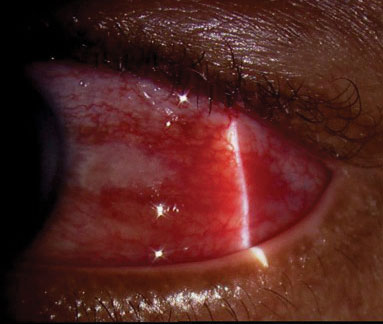 |
| Diffuse anterior scleritis in a 58-year-old male with a subsequent negative systemic workup. Photo: Katherine Sanford, OD. Click image to enlarge. |
Systemic medications, typically NSAIDs, have been the standard treatment for anterior scleritis, but researchers recently suggested that difluprednate may be more effective.
The study included 25 patients (35 eyes) who were a median age of 60 years old. Of the eyes, 40% had bilateral disease, 44% had an associated systemic disease and the majority (66%) had diffuse anterior scleritis.
The team found that difluprednate 0.05% resolved anterior scleritis in 83% of eyes over six weeks when used four or more times a day with few side effects. Four eyes lost two or more lines of BCVA, and nine had elevated IOP, which was similar to previous findings. There was no significant relationship between difluprednate and elevated IOP, but the authors recommend clinicians monitor IOP elevation over time in these patients.
“Among eyes treated with difluprednate six or more drops daily, the median time to clinical resolution was three weeks,” the investigators wrote. “Thus, treatment with difluprednate appeared to result in a higher percentage of eyes achieving resolution of anterior scleritis and in a shorter time than reported in a study using prednisolone acetate 1% every two hours, where 47% of patients achieved clinical resolution within eight weeks. Our results suggest that an initial dosing of difluprednate four drops per day or more leads to the highest percentage of patients achieving clinical resolution.”
The authors also looked at the ability to taper and discontinue difluprednate. Over the course of a year, almost 60% of eyes in 60% of patients were able to discontinue treatment in a median time of 18 weeks. For those eyes that stopped difluprednate, the relapse of scleral inflammation occurred in the remaining 40% of eyes, which suggests the medication should be used for short-term treatment only. “Continued clinical monitoring is necessary to identify relapses, especially within the two years following discontinuation of medication,” the authors explained.
They concluded that difluprednate may be a safe and effective option, but added that further study is warranted to look at the effects of a suppressive dose on preventing relapse over time.
Liberman P, Burkholder BM, Thorne JE, Berkenstock MK. Effectiveness of difluprednate for the treatment of anterior scleritis. Am J Ophthalmol. September 9, 2021. [Epub ahead of print]. |

